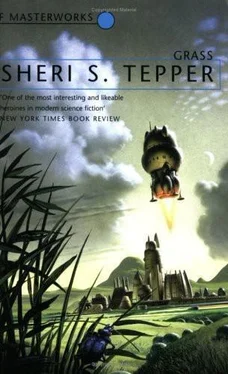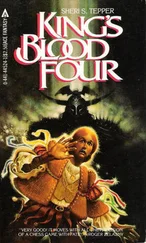Sheri Tepper - Grass
Здесь есть возможность читать онлайн «Sheri Tepper - Grass» весь текст электронной книги совершенно бесплатно (целиком полную версию без сокращений). В некоторых случаях можно слушать аудио, скачать через торрент в формате fb2 и присутствует краткое содержание. Город: London, Год выпуска: 2002, ISBN: 2002, Издательство: Gollancz, Жанр: Фантастика и фэнтези, на английском языке. Описание произведения, (предисловие) а так же отзывы посетителей доступны на портале библиотеки ЛибКат.
- Название:Grass
- Автор:
- Издательство:Gollancz
- Жанр:
- Год:2002
- Город:London
- ISBN:9781857987980
- Рейтинг книги:4 / 5. Голосов: 1
-
Избранное:Добавить в избранное
- Отзывы:
-
Ваша оценка:
- 80
- 1
- 2
- 3
- 4
- 5
Grass: краткое содержание, описание и аннотация
Предлагаем к чтению аннотацию, описание, краткое содержание или предисловие (зависит от того, что написал сам автор книги «Grass»). Если вы не нашли необходимую информацию о книге — напишите в комментариях, мы постараемся отыскать её.
Grass — читать онлайн бесплатно полную книгу (весь текст) целиком
Ниже представлен текст книги, разбитый по страницам. Система сохранения места последней прочитанной страницы, позволяет с удобством читать онлайн бесплатно книгу «Grass», без необходимости каждый раз заново искать на чём Вы остановились. Поставьте закладку, и сможете в любой момент перейти на страницу, на которой закончили чтение.
Интервал:
Закладка:
“Nothing. Go home. Forget you came here. Forget you said anything, as I will try to do.”
He rose, unwillingly, reluctantly, far more stirred to passion by her refusal than he would have been by her consent. He could not let her go. “I will be your friend,” he cried. “And you must be mine. This business of the plague, we must not forget that. You need me to help you with that!”
She turned back to him, her arms crossed protectively across her breasts. “Yes, we need you, Sylvan. If you will. But not if you talk about this other thing.” Her throat was dry. She longed to comfort him, he seemed so distraught, but she did not dare touch him or even smile at him.
“Very well, then. I will not talk about this other thing.” He made a wide, two-handed gesture, as though casting everything away, though he gave up nothing. If talking of love was not the way to Marjorie’s affection, he would try to find some other way. He would not give up courting her. He did not understand Marjorie’s religion, but he would learn about it. Obviously it tolerated many things it did not allow. Otherwise that proud, harsh man, her husband, would not be able to keep his mistress almost upon his wife’s doorstep!
He stayed, for a time, sitting a good distance from her, discussing the things she needed to know. He promised to do everything he could to find out whether there was any unusual disease upon Grass. He let nothing happen to disturb her again, controlling their conversation with a courtly charm, seeing her gradually relax, lower her defenses, become the woman he had danced with. When he left her, he felt his eyes grow wet, wondering what she thought of him, amazed that it mattered to him that much. He was no youngster to worry what a woman thought! And yet… and yet he did.
She, looking after him, was more stirred than she had been in years, wishing with all her heart that he had never come, that he had never spoken, or that she had met him before she had met Roderigo Yrarier.
It was an evil thought. She went to the chapel and prayed. Over the years, prayer had comforted her. It did not do so now, though she knelt for most of an hour, seeking peace. The light over the altar glowed red Once she had thought of it as a holy eye, seeing her, but she did not think it saw her now. She had been God’s child once. Now she was only a thinking virus, a thing beset by longings with no appeasement allowed. “How long has it been since I laughed at something?” she asked herself. “How long since we have had any fun at all, as a family?” She could remember both, and it had been long, too long ago, when Stella was still a child, before Rigo had Eugenie.
She went outside. The afternoon had grown chill. From the northeast came the muted roar of an aircar. She hurried toward the graveled court where it would land, stood there shivering and looking up. She needed Rigo, needed Stella, needed family, needed to belong to someone, be held by someone. She would make them offer her something, make them show some affection. She would beg it, demand it!
The car came slowly closer, from a speck to a ball, from a ball to an ornament, one of the ornaments her family had used to hang upon trees at Christmas time, bulging with rococo extravagance.
It landed. The door opened and the servant who had piloted it got out and went away, without looking at her. Rigo came out, facing the car, turning slowly until he saw her, He did not move then, just stood there, his face still and empty. There was an endless moment during which nothing moved at all, a moment in which a first dreadful suspicion hardened into certainty.
“Stella!” she cried, her voice shrilling into the wind.
Rigo made a hopeless gesture but said nothing. He did not move toward her. She knew he was too ashamed to do so, that he knew there was nothing he could ever say which would help at all.
“Brother Mainoa,” she insisted, pounding her fist on the kitchen table where she found Father James and her son having an evening snack together. “Brother Mainoa knows something! He’s been out in the grass. He’s seen. Things. If the Hippae have taken Stella, he’s the only one who can possibly help us.”
“Where is your husband?” the priest asked. “Marjorie, where is Uncle Rigo?”
“I don’t know,” she said, turning wild eyes upon him. “He came into the house.”
“What exactly did he say?”
“That she was gone. Vanished. She never returned. Like Janetta. Like the bon Damfels girl. Gone.” She gulped for air, as though she could not possibly get enough into her lungs. “He won’t be any use. He’s like them. Like Stavenger and like the Obermun bon Haunser. I’ve been thinking who to ask. Not any of the bons. They don’t do anything about it when their own children get carried off; they wouldn’t do anything for mine. Not anyone from Commons. They don’t know anything about it. Not villagers. They’re frightened to death of the grass. I wish you could have seen Sebastian Mechanic’s face when he was telling me about the thundering in the night. But someone told him! Who do you suppose? I asked. He says Brother Mainoa. It always comes back to Brother Mainoa!”
“Do you want to go there now, Marjorie?”
“Now. Yes.”
“Have you checked to be sure he’s there?”
“No.” She sobbed helplessly. “He has to be there.”
The priest nodded at Tony, then toward the tell-me link in the corner of the kitchen, before rising to fold Marjorie in his arms. He was no taller than she, and slighter, but he gave her enough support that he could urge her into a chair and make her sit there until she grew quieter. Tony muttered in the corner once, then again before snapping off the link and turning back to them.
“He’s there. Him and the other one, I told him what happened. He says he’d come to you but he doesn’t have a car. You can come to him, or I’ll go get him and bring him here.”
“I’ll go.” She jumped up, staring wildly around herself. “I was wicked, Father James. I resented her. God has taken her away because of—”
“Marjorie!” he shouted, shaking her. “Stop that! Is God so unjust that he would punish your daughter because of something you did? You won’t help Stella by having fits of guilt. Stop it.”
She gulped again, visibly taking hold of herself. “Yes. Oh, yes, of course. I’m sorry. You’re right. Tony, grab whatever food you can put together in five minutes. You and Father James will be hungry. I must get my coat.”
She ran out and they heard her footsteps clattering along the hallway, stumbling at first, then slowing into a firm, rapid walk as she took better control of herself. She returned in moments and did not break down again during the flight.
In the Arbai city, Brother Lourai took them to the home he and Mainoa occupied, one of the excavated houses made weathertight, with a stove in one corner and a few pieces of furniture that fit human bodies. Brother Lourai conducted them there through a downpour of rain, and Brother Mainoa refused to let Marjorie talk until she had shed her wet cloak and was settled with a steaming cup before her. Then, unable to contain herself a moment longer, she poured out the story of Stella’s disappearance.
“Why did you come to me?” he asked.
“You know why,” she answered, like a challenge. “You may have fooled everyone else with that business about theoretical discussions and postulating what the foxen think, but I think that was real, at least partly. I think you know things the rest of us don’t know. About the Hippae, maybe. About the foxen. About what goes on out there in the grasses.”
“You want to find your daughter.”
“Of course I want to find my daughter.”
“Even if she is like the other girl. Janetta bon Maukerden. Even if your daughter is like that?”
Читать дальшеИнтервал:
Закладка:
Похожие книги на «Grass»
Представляем Вашему вниманию похожие книги на «Grass» списком для выбора. Мы отобрали схожую по названию и смыслу литературу в надежде предоставить читателям больше вариантов отыскать новые, интересные, ещё непрочитанные произведения.
Обсуждение, отзывы о книге «Grass» и просто собственные мнения читателей. Оставьте ваши комментарии, напишите, что Вы думаете о произведении, его смысле или главных героях. Укажите что конкретно понравилось, а что нет, и почему Вы так считаете.












